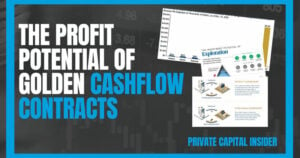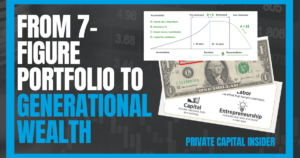In case you missed it, we’ve decided to dedicate this month to you, the investor, and call it “Investor Month”.
If you have Pre-IPO investing questions you’d like me to address this month, go here and fill out this short survey.
Today, we’ll be talking about a common – and timely – request we get from our Equifund subscribers…
What tax considerations should I be aware of when investing in private market investments (like Pre-IPO)?
Before we get started, here is the very bright line disclaimer…
- Equifund is not legally allowed to provide any individualized investment advice, tax advice, or legal advice. The contents of this email should be for informational purposes only. PLEASE talk to a professional to help you with your own individual situation.
With that said, I’ve been working in the financial publishing industry since 2016 and have read dozens of “how to pay less taxes” books and courses…
I’ve helped tax planning experts create marketing strategies to get more customers for their business…
And I’ve ghostwritten several articles on tax reduction strategies for business owners and investors.
The biggest thing I’ve learned through all of this?
Even though there are some snazzy deductions you might be able to pick up at the last minute before filing your taxes this month…
The very best tax savings come with proper planning that looks multiple years – or decades – into the future.
For this, you will almost certainly need the help of a qualified professional who can model out different scenarios and strategies for your specific situation.
The key is to know enough about how taxes work so you can ask the right questions when hiring a tax advisor.
With this in mind, let’s start with some basics.
A brief history of the US Tax Code
Generally speaking, Americans hate paying taxes.
Our distaste for them stems all the way back to the American revolution as our forefathers cried, “No taxation without representation.”
The slogan underpinned our firm belief that the government should not tax citizens unless they’re represented in some manner in the government.
The English Bill of Rights 1689 had forbidden the imposition of taxes without the consent of Parliament. However, since the colonists had no representation in Parliament, the taxes violated the guaranteed Rights of Englishmen.
This issue is eventually what led to the American Revolution… and laid the groundwork for the American indignation around the subject of taxes.
Our founding fathers rejected the idea of income taxes entirely. However, when they spoke of the idea of taxes, they recognized the need for equal treatment under the law.
The US Constitution says “[A]ll duties, imposts and excises shall be uniform throughout the United States,” reads the U.S. Constitution.
In James Madison’s words, “the spirit of party and faction” would prevail if Congress could tax one group of citizens and confer the benefits on another group.
Put another way, if different people paid different tax rates, it would sow the seeds of “class warfare.”
This thinking prevailed through much of the 1800s. However, the first progessive income tax – which is essentially “the more you earn, the larger the percentage of tax you must pay” – was enacted during the American Civil War (later repealed in 1872).
Then, in 1894, Congress passed another income tax – one that only hit the top 2 percent of wealth holders – which the Supreme Court declared unconstitutional.
The 77 year old Stephen Field, a 30 year veteran on the Court, was outraged. A small progressive tax, he predicted, “will be but the stepping stone to others, larger and more sweeping, till our political contests will become a war of the poor against the rich.”
For the sake of brevity, I’ll spare you the next century of American tax policy and the ways in which it’s been abused…
But like it or not, today, we Americans live under a progressive income tax…
In the United States, the progressive federal tax bracket system has seven brackets that range from 10% – 37%.
And chances are, these tax rates will likely continue to climb higher as time goes on.
For this reason alone, it’s key that you understand the basics of how taxes work today… and what you can do to lawfully reduce them to the legal minimum.
And if you’d like to get yourself as close to a Tax Free Retirement as possible, there are three basic investment “accounts” you’ll need to consider:
- Taxable – You pay taxes on the realized gains (not paper gains), dividends, and interest income, every year.
Every year, you’ll receive a 1099 from the financial institution for reporting how much income you generated from your investments.
For example, if you have $100,000 in a certificate of deposit (CD) that generates a 1% return, at the end of the year you have a $1,000 gain.
This amount is added to your Adjusted Gross Income (AGI) which is the basis for how much tax you pay each year.
Note: If you have any of your previous tax returns laying around, you’ll find your AGI number on your Form 1040, line 11.
Why would you want to have investments in this bucket? The answer is liquidity; you can access that money at any time – without penalty – in case of emergency.
For this reason, many people own stocks inside of their taxable brokerage account…
And it’s why they buy private market investments (like Pre-IPO) as an individual.
Once the investment is sold, you will pay ordinary income taxes if you held the investment for less than one year… and you will pay capital gains taxes if you held the investment for longer than one year.
As you can see from the chart below, capital gains are taxed at a far lower rate than ordinary income (and it’s why investors look to get as much of their taxable income into this schema as possible).
As a general consideration, if you are investing in Pre-IPO companies, you will likely be holding it for longer than one year, and be subject to capital gains tax.
However, this taxable bucket can cause some complicated problems for how Social Security benefits are taxed.
Be sure to talk to an expert about retirement income planning to determine the best way to structure your investments to avoid any unforeseen tax consequences.
- Tax-Deferred – contributions are tax deductible, gains grow tax free, distributions are taxed as ordinary income.
Most Americans are familiar with retirement accounts – like 401(k)s and IRA – that are tax-deferred vehicles.
On one hand, contribution you make to tax-deferred accounts can lower your AGI and therefore lower your annual tax bill today.
[Note: for investment property owners, you may effectively defer capital gains taxes by using a Section 1031 Exchange.
There is a similar provision for Qualified Small Business Stocks – called a Section 1045 Exchange – that allow startup investors to defer capital gains as well.
Both of these are topics require individual attention that we’ll explore in future issues.]
However, on the other hand, you don’t know what the tax rate will be in the future when you decide to withdraw funds.
If you plan on investing in Pre-IPO companies in your tax-deferred accounts, you’ll pay no tax if and when you sell…
But once that money comes out of your account, you’ll pay tax as if it was ordinary income (vs capital gains).
- Tax-Free – No federal, state, or capital gains tax required.
Seems too good to be true, right? However, that’s exactly what a Roth IRA provides for investors.
When you put money into a Roth IRA, because you are using after-tax ordinary income, any and all investment gains are 100% tax free, as long as you don’t take them out before the minimum distribution age, or there’s an early withdrawal penalty of 10%.
This means if you invest using your Roth IRA, any and all gains you make are yours… tax free.
Most people can contribute up to $6,000 to a Roth IRA in 2021 and 2022. If you are 50 or older, the limit is $7,000.
Quick reminder: You have until Friday, April 15th to make contributions for 2021.
As a special kicker, if your AGI is less than $50,000, the Roth IRA comes with something called the Saver’s Tax Credit; up to an additional $1,000, non-refundable tax credit each year (go here for more details on this).
However, the IRS sets income limits that prevent high-income earners from contributing to these plans.
Be sure to check what your contribution limits are before opening an account.
Final Thoughts
With the April 15th deadline this Friday, taxes are on everyone’s mind.
While it might be too late to do damage control on the taxes you’ll pay for 2021…
Make sure you start planning for 2022 taxes as soon as possible!
Most of the very best tax reduction strategies I’ve learned require structuring proper investment vehicles… setting up specialized investment accounts… and even some creative usages of life insurance policies.
But the key takeaway is that all of these things have to be set up in advance of your investment activity.
If you’re interested in doing more advanced retirement planning and tax planning, it’s definitely worth hiring an expert.
However, for many people, there are two simple ways to reduce your tax bill from investment activity.
- Hold investments for longer than one year to take advantage of the lower capital gains rate. This should be easy to do as the vast majority or Pre-IPO investments you own will take longer than one year to exit.
- Consider investing with your retirement accounts. Because of the longer hold times – and the asymmetric return profile we’re hoping for in Pre-IPO – it can be an opportunity to take small bets that produce potentially huge rewards (go here to read our guide on investing with your retirement accounts).
As usual, these types of investments should be considered high risk and speculative in nature. Please don’t use funds you need immediate access to – like your rent or grocery money – or otherwise cannot afford to lose.
Sincerely,
Jake Hoffberg – Publisher
Equifund
P.S. If you have Pre-IPO investing questions you’d like me to address this month, go here and fill out this short survey.
We’ve had several requests for things like…
- How does Equifund find deals and perform due diligence?
- How does the IPO process work?
- How do I sell my Pre-IPO shares?
- How do I track the value of my portfolio?
- How long does it take for a company to go public?
Let me know what’s on your mind.














